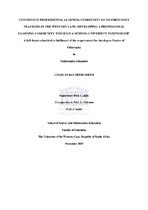| dc.description.abstract | Ways of enacting effective professional development (PD) and professional learning (PL) of teachers are diverse and often contested and therefore needs sustained inquiry (Schuck, Aubussona, Kearney, & Burden, 2013). The “quick fix” mentality that is endemic to most including those aimed at educational systems leads to very superficial implementation of improvement strategies, including teacher development. These strategies are usually bureaucratically mandated and superficially implemented in a top-down manner. One of the critical drawbacks of such superficial implementation of top-down improvement strategies is that it fails to appeal to teachers because of their historical experiences of such short term and intermittent improvement interventions.
This study focussed on the development of a Professional Learning Community (PLC) as a possible continuous professional teacher development (CPTD) model with a promise to deliver effective CPTD. Literature in this regard indicates this model of CPTD as highly effective to support sustained teacher development. The efficacy a PLC is predicated on a collaborative and relational approach to teacher development and professional learning underpinned by a microclimate of commonality.
The initiation of PLCs is a complex task. It requires a deep understanding of the processes involved in orientating teachers to processes that involve reflective dialogue and collaborative inquiry. Hence this study sought to investigate experiences of teachers in a PLC established through an alliance involving teachers, didacticians and education officials. This study found that the PLC signifier conveys significant meaning for teachers in terms of their engagement in the PLC. Moreover, teachers’ experiences of the PLC model confirmed the generally accepted features of a PLC. The importance of having a common vision, norms and standards was shown to be an important dimension of the PLC. Besides the fact that the active promotion of this shared vision by the PLC leadership and other education administrators was highlighted, teachers in general accepted the importance of being reflective practitioners. Despite this belief in the value of collaborative reflection, this study found that it does not take place as often as one would expect. This is, to some extent, due to the timetabling arrangements at most schools in the sample. Findings of this investigation provided evidence that it is possible in a PLC to effect a shift from professional development to professional learning. This is consistent with literature in this regard, for example, Benken & Brown (2010) support this argument by indicating that CPTD should be viewed as professional learning that is sustained over time. However, the issue of sustainability is an important challenge. This study revealed that teachers see sustainability as a function of three important variables, namely, recognition by school leadership and administrators, support from the organised teacher movements and subject organisations, and teacher commitment. Important affordances of a PLC identified through this study are relational agency, epistemic agency and a micro-climate of commonality. These affordances are viewed as important enablers of collaborative inquiry and reflective dialogue and underscores the community aspect of a PLC. | en_US |

